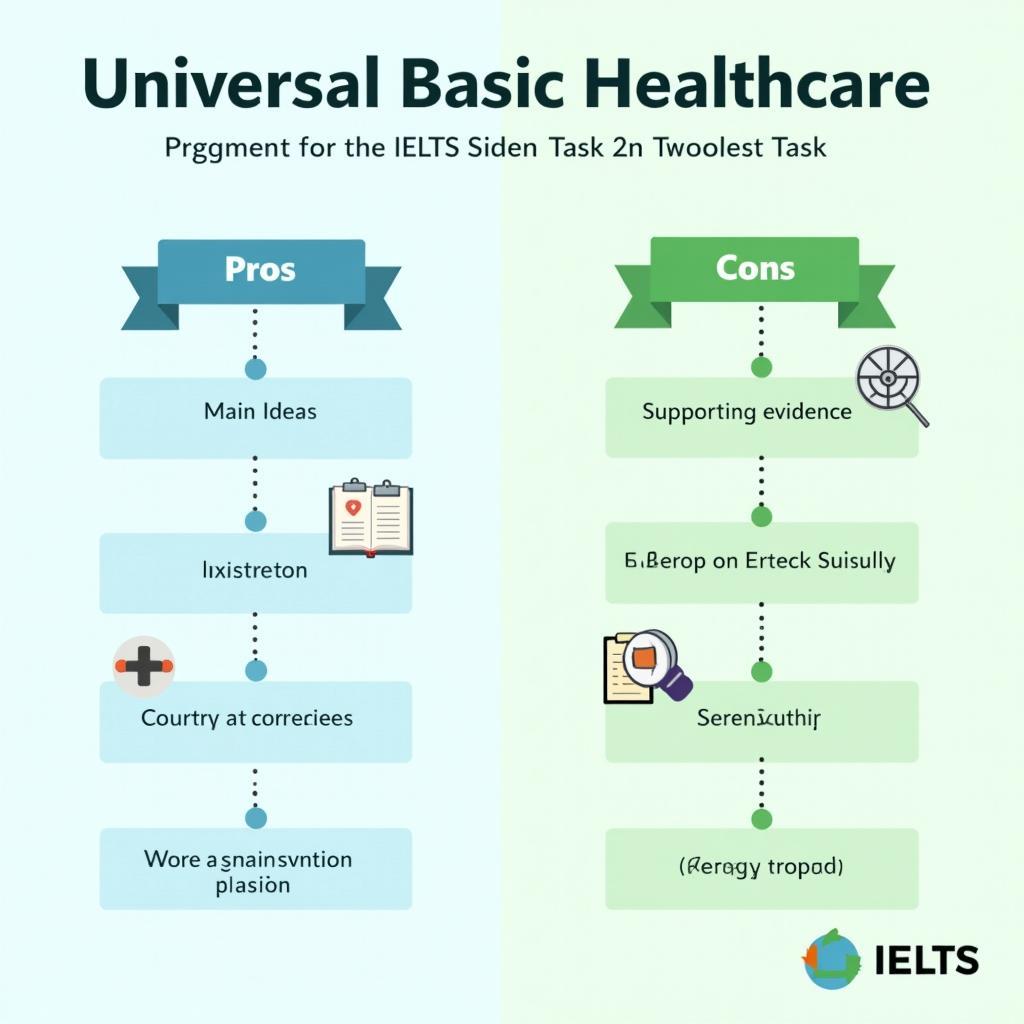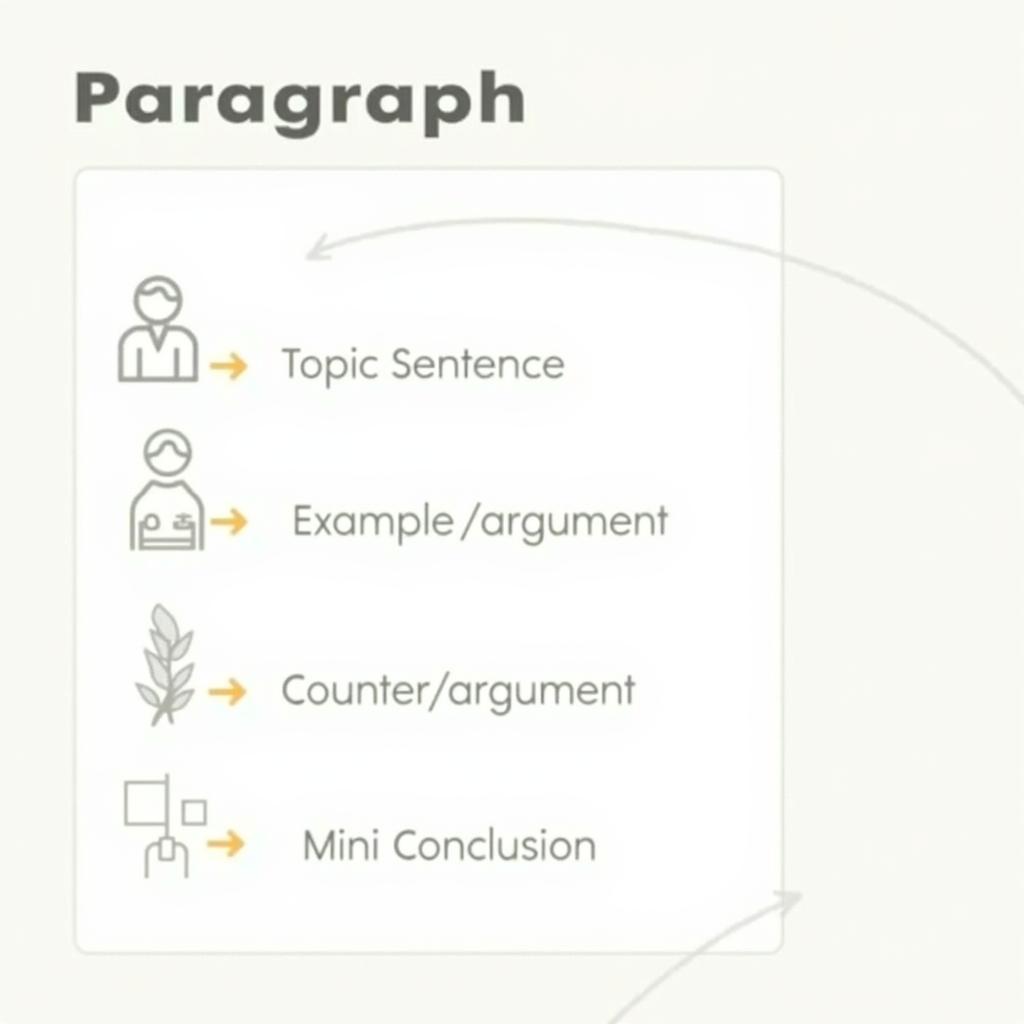Mở bài
Chủ đề Should Governments Implement Universal Basic Healthcare xuất hiện thường xuyên trong IELTS Writing Task 2 dưới dạng các câu hỏi về vai trò của chính phủ trong y tế công, chi tiêu ngân sách, hay tranh luận “phòng bệnh hơn chữa bệnh”. Đây là một mảng nội dung quan trọng vì đòi hỏi thí sinh thể hiện kỹ năng tranh luận logic, sử dụng dẫn chứng xã hội và triển khai lập luận cân bằng. Trong bài viết này, bạn sẽ học được: 3 bài mẫu hoàn chỉnh ở các mức Band 5-6, 6.5-7 và 8-9; phân tích chấm điểm chi tiết theo 4 tiêu chí; từ vựng và cấu trúc “ăn điểm”; checklist tự đánh giá; và chiến lược viết hiệu quả cho đề tài y tế công.
Một số đề thi thực tế đã được xác minh từ các nguồn uy tín:
- IELTS Liz (Health Essay Topics): “Prevention is better than cure. A large proportion of a country’s health budget should be diverted from treatment to spending on health education and preventive measures. To what extent do you agree or disagree?”
- IELTS-Blog (Reported Task): “Medical services should be run by private companies rather than the government. To what extent do you agree or disagree?”
- British Council (Practice materials – Public health topic): “Some people believe that the government is responsible for public health, while others think that individuals should be responsible for their own health. Discuss both views and give your opinion.”
Trong bài này, tôi chọn khai thác đề gần gũi nhất với từ khóa: universal basic healthcare (chăm sóc y tế cơ bản phổ cập) để bạn luyện tập dạng “Discuss both views + Opinion” – một dạng rất phổ biến và dễ đo điểm nếu có chiến lược đúng.
 Sơ đồ dàn ý bài IELTS Writing Task 2 về should governments implement universal basic healthcare
Sơ đồ dàn ý bài IELTS Writing Task 2 về should governments implement universal basic healthcare
1. Đề Bài và Phân Tích
Some people argue that governments should implement universal basic healthcare for all citizens, while others believe healthcare should remain primarily a private responsibility. Discuss both views and give your own opinion.
Dịch đề: Một số người cho rằng chính phủ nên triển khai chăm sóc y tế cơ bản phổ cập cho mọi công dân, trong khi những người khác tin rằng chăm sóc sức khỏe chủ yếu nên là trách nhiệm cá nhân. Hãy thảo luận cả hai quan điểm và nêu ý kiến của bạn.
Phân tích đề bài:
- Dạng câu hỏi: Discuss both views + Give your opinion. Bạn phải trình bày cân bằng hai phía và chốt quan điểm rõ ràng.
- Thuật ngữ quan trọng:
- Universal basic healthcare: hệ thống đảm bảo mức chăm sóc y tế cơ bản cho mọi công dân, thường được trợ cấp/tài trợ công.
- Implement: triển khai về chính sách, bao gồm lập pháp, tài chính và hành chính.
- Private responsibility: cá nhân (và đôi khi khu vực tư nhân) tự chi trả và quản lý sức khỏe của mình.
- Lỗi thường gặp:
- Lệch đề khi chỉ bàn “free healthcare for all” mà bỏ qua phạm vi “basic” (cơ bản) và “implementation” (khía cạnh chính sách).
- Nhầm “universal” với “global” (toàn cầu).
- Không cân bằng hai quan điểm, hoặc không đưa ra opinion rõ ràng ở kết bài.
- Ngôn ngữ tuyệt đối hóa (“always”, “never”), ví dụ gây tranh cãi chính trị cụ thể.
- Cách tiếp cận chiến lược:
- Mở bài: Paraphrase + introduce both views + thesis rõ ràng.
- Thân bài 1: Lập luận ủng hộ universal basic healthcare (công bằng, phòng bệnh, năng suất lao động, hiệu quả chi phí dài hạn).
- Thân bài 2: Lập luận nghiêng về private responsibility (gánh nặng thuế, quá tải/đợi chờ, giảm động lực tự chăm sóc), kèm nhượng bộ và phản biện.
- Kết bài: Khẳng định quan điểm, đề xuất mô hình cân bằng (ví dụ: hệ thống hỗn hợp – mixed system).
2. Bài mẫu Band 8-9
Đặc điểm: Quan điểm nhất quán, lập luận đa chiều, ví dụ khái quát, từ vựng học thuật chính xác, cấu trúc câu linh hoạt.
Essay (≈300 words):
In recent years, few public policies have sparked as much debate as whether states should roll out universal basic healthcare. Proponents argue that such systems are morally imperative and economically sensible, whereas critics warn of tax burdens and bureaucratic inefficiencies. In my view, a carefully designed universal scheme covering essential services is both equitable and cost-effective in the long term.
Supporters contend that health is a foundational public good. When basic care—vaccinations, primary consultations, maternal health—is guaranteed, populations experience better aggregate health outcomes, which improves productivity and reduces downstream costs from untreated illnesses. Moreover, universal coverage mitigates the cruel trade-off families face between paying rent and paying for treatment. From a macroeconomic perspective, shifting resources toward preventive care yields high returns, as early intervention is typically cheaper than late-stage treatment.
Skeptics, however, raise legitimate concerns. Universal coverage can strain public finances, crowd hospitals, and lengthen waiting times if capacity is not scaled up accordingly. They also fear that removing price signals might encourage overuse of services, leading to rationing. These risks are real but manageable. Policy tools—such as means-tested co-payments for non-essential services, tighter gatekeeping via primary care, and investment in digital triage—can reduce unnecessary demand while safeguarding access to essentials.
Ultimately, a mixed model appears most prudent: the state guarantees a robust floor of basic services, while individuals and insurers can purchase supplementary coverage. This preserves solidarity without stifling innovation or choice. Crucially, implementation must be sequenced: expand primary care capacity, set clear benefit packages, and employ rigorous data to allocate resources dynamically. With these safeguards, universal basic healthcare is not only ethically justified but also fiscally sustainable.
Phân tích Band điểm
| Tiêu chí | Band | Nhận xét |
|---|---|---|
| Task Response (Hoàn thành yêu cầu) | 8.5 | Trả lời đầy đủ hai quan điểm, có opinion rõ ràng và giải thích thuyết phục. Lập luận có chiều sâu (giải pháp: co-payments, gatekeeping), ví dụ khái quát hợp lý. |
| Coherence & Cohesion (Mạch lạc & Liên kết) | 8.0 | Bố cục 4 đoạn rõ ràng; câu chủ đề chặt chẽ; liên kết logic bằng chuyển ý tinh tế. Một số cụm nhấn mạnh giúp dòng chảy tự nhiên. |
| Lexical Resource (Từ vựng) | 8.5 | Từ vựng học thuật phong phú và chính xác: aggregate health outcomes, cost-effective, means-tested, gatekeeping, triage. Collocations chuẩn. |
| Grammatical Range & Accuracy (Ngữ pháp) | 8.0 | Đa dạng cấu trúc: mệnh đề nhượng bộ, cụm danh từ phức, câu điều kiện ngầm. Lỗi không đáng kể, kiểm soát tốt dấu câu. |
Các yếu tố giúp bài này được chấm điểm cao
- Nêu vấn đề và quan điểm sớm, xuyên suốt nhất quán.
- Cân bằng hai phía, đồng thời đưa ra giải pháp chính sách cụ thể.
- Sử dụng thuật ngữ chính xác: preventive care, overuse, rationing, mixed model.
- Câu chủ đề dẫn dắt rõ ràng, mỗi đoạn phát triển một ý trung tâm.
- Dẫn chứng kinh tế – xã hội mức khái quát, tránh số liệu bịa đặt.
- Kết luận không chỉ lặp lại mà còn đề xuất lộ trình triển khai.
- Sử dụng ngôn ngữ đánh giá thận trọng (legitimate concerns, manageable).
 Dàn ý đoạn văn cho bài mẫu band 8-9 về healthcare với chủ đề tranh luận
Dàn ý đoạn văn cho bài mẫu band 8-9 về healthcare với chủ đề tranh luận
3. Bài mẫu Band 6.5-7
Đặc điểm: Lập luận rõ, nhưng ví dụ ít tinh tế; từ vựng khá; có lặp từ và kết nối ý đơn giản hơn.
Essay (≈260 words):
Whether governments should implement universal basic healthcare is a controversial topic. Some people believe it is the state’s duty to make sure everyone can see a doctor, while others argue that individuals should pay for themselves to avoid heavy taxes. In my opinion, a basic level of public healthcare is necessary, but it should be combined with private options.
On the one hand, universal services ensure fairness. Poor families can receive vaccinations and regular check-ups, which prevents serious diseases and keeps the workforce healthy. In addition, if people get early treatment, the system may actually save money because it avoids costly hospital stays later. This approach can also reduce anxiety for citizens who are afraid of medical bills.
On the other hand, providing healthcare for everyone is expensive. It can lead to long waiting times, and some patients might use services too often because they are free. To deal with this, the government could limit the free package to essential services and ask for small co-payments for non-urgent treatments. Private clinics should remain available for people who want faster access.
Overall, I support a mixed system that offers a basic safety net and allows private choices. This model balances fairness and efficiency, and it fits different needs in society. With careful planning and regular evaluation, the government can protect public health without causing too much pressure on the national budget.
Phân tích Band điểm
| Tiêu chí | Band | Nhận xét |
|---|---|---|
| Task Response (Hoàn thành yêu cầu) | 7.0 | Trả lời đúng yêu cầu, có quan điểm, có giải pháp. Một số ý còn khái quát, ví dụ chưa sâu. |
| Coherence & Cohesion (Mạch lạc & Liên kết) | 7.0 | Bố cục hợp lý; dùng liên từ cơ bản (on the one hand/on the other hand). Có lặp cấu trúc nhưng mạch lạc. |
| Lexical Resource (Từ vựng) | 6.5 | Từ vựng phù hợp chủ đề; có lặp (basic, services). Collocations nhìn chung đúng, chưa thật đa dạng. |
| Grammatical Range & Accuracy (Ngữ pháp) | 6.5 | Câu ghép, phức cơ bản; ít lỗi nhỏ. Chưa nhiều cấu trúc nâng cao. |
So sánh với bài Band 8-9
- Band 8-9 có thuật ngữ chuyên sâu (means-tested, gatekeeping), 6.5-7 dùng từ phổ thông hơn.
- Band cao có phản biện và đối sách cụ thể; bài 6.5-7 nêu giải pháp nhưng chưa triển khai chi tiết.
- Cấu trúc câu ở Band 8-9 đa dạng hơn (mệnh đề nhượng bộ, nhóm danh từ phức); bài 6.5-7 thiên về câu ghép đơn giản.
- Mức độ kiểm soát giọng văn học thuật: Band 8-9 thận trọng, chính xác; Band 6.5-7 thẳng và an toàn.
4. Bài mẫu Band 5-6
Đặc điểm: Ý có liên quan nhưng phát triển chưa cân bằng, từ vựng hạn chế, lỗi ngữ pháp và mạch lạc.
Essay (≈260 words):
People think different about whether government should give universal healthcare. I believe it is good idea, but there are many problems also. First, when healthcare is free, many people goes to hospital even for small sick, which makes longer queueing. This is bad and government will pay a lot of money for all citizen. Tax will be higher.
However, there are benefits. Poor people can get treatment and children can have vaccine freely. If people are healthy, they can work better and the country grow faster. Also, people feel safe because hospital costs are not heavy burden anymore.
To solve problems, I think we should make basic healthcare is provide, like check up and medicine with low price or free, but for non-urgent surgery people should pay some money so they do not overuse. Private hospital can help people who want faster service, and public hospital can help people who don’t has enough money. In conclusion, universal basic healthcare is good policy for many peoples, but we must control cost and avoid waste resource.
Phân tích Band điểm
| Tiêu chí | Band | Nhận xét |
|---|---|---|
| Task Response (Hoàn thành yêu cầu) | 5.5 | Có nêu 2 phía và opinion nhưng phát triển ý thiếu chiều sâu; ví dụ chung chung. |
| Coherence & Cohesion (Mạch lạc & Liên kết) | 5.5 | Kết nối còn yếu, từ nối đơn điệu; một số câu chuyển ý đột ngột. |
| Lexical Resource (Từ vựng) | 5.5 | Từ vựng hạn chế, nhiều collocation sai (“small sick”, “vaccine freely”). |
| Grammatical Range & Accuracy (Ngữ pháp) | 5.0 | Lỗi mạo từ, chia động từ, danh từ số nhiều; cấu trúc câu đơn giản, đôi chỗ sai trật tự từ. |
Những lỗi sai của bài – phân tích & giải thích
| Lỗi sai | Loại lỗi | Sửa lại | Giải thích |
|---|---|---|---|
| many people goes | Chia động từ | many people go | “People” là số nhiều nên động từ ở dạng nguyên mẫu không “-s”. |
| small sick | Collocation | minor illnesses | “Sick” không đi với “small”; dùng “minor illnesses” hoặc “minor ailments”. |
| longer queueing | Danh từ | longer queues / longer waiting times | “Queueing” là động danh từ; ở đây cần danh từ đếm được hoặc cụm danh từ cố định. |
| government will pay a lot of money for all citizen | Mạo từ & số nhiều | the government will pay a lot of money for all citizens | “Citizen” phải ở dạng số nhiều; cần “the” trước “government” khi nói cụ thể. |
| vaccine freely | Collocation | vaccines for free / free vaccinations | Dùng “free vaccinations” là tự nhiên hơn. |
| not heavy burden | Mạo từ | not a heavy burden | Thiếu mạo từ “a”. |
| basic healthcare is provide | Bị động | basic healthcare is provided | Thiếu “-ed” ở thì bị động. |
| don’t has | Chia động từ | don’t have | “Don’t” đi với “have”, không “has”. |
| good policy for many peoples | Danh từ không đếm được | good policy for many people | “People” ở dạng số nhiều không thêm “s”. |
| avoid waste resource | Mạo từ & tính từ | avoid wasting resources / avoid resource waste | Collocation tự nhiên hơn; “resource” thường số nhiều trong ngữ cảnh này. |
Cách Cải Thiện Từ Band 6 Lên Band 7
- Mở rộng ý bằng ví dụ cụ thể: nêu nhóm dịch vụ “basic” (vaccination, GP visits), giải pháp kiểm soát (co-payment, referral system).
- Nâng collocation: “waiting times”, “health equity”, “safety net”, “preventive care”.
- Đa dạng cấu trúc câu: mệnh đề nhượng bộ (Although), câu điều kiện (If), cụm phân từ (By investing…).
- Kiểm soát lỗi mạo từ (a/an/the), danh từ số ít/nhiều, chia động từ theo chủ ngữ.
- Liên kết đoạn bằng cụm nối học thuật: “Furthermore”, “Conversely”, “That said”.
5. Từ vựng quan trọng cần nhớ
| Từ/Cụm từ | Loại từ | Phiên âm | Nghĩa tiếng Việt | Ví dụ (English) | Collocations |
|---|---|---|---|---|---|
| universal healthcare | n. | /ˌjuːnɪˈvɜːsl ˈhelθkeə(r)/ | chăm sóc y tế phổ cập | Universal healthcare can reduce catastrophic expenses. | universal coverage, universal access |
| basic benefit package | n. | /ˈbeɪsɪk ˈbenɪfɪt ˈpækɪdʒ/ | gói quyền lợi cơ bản | Define a basic benefit package before rollout. | define/set/design a package |
| preventive care | n. | /prɪˈventɪv keə(r)/ | chăm sóc dự phòng | Preventive care lowers long-term costs. | invest in, emphasize, prioritize |
| cost-effective | adj. | /ˌkɒst ɪˈfektɪv/ | hiệu quả chi phí | Vaccination is highly cost-effective. | cost-effective measures/solutions |
| health equity | n. | /helθ ˈekwɪti/ | công bằng y tế | Universal schemes promote health equity. | promote, advance, undermine |
| waiting times | n. pl. | /ˈweɪtɪŋ taɪmz/ | thời gian chờ | Digital triage can cut waiting times. | cut/reduce, long/prolonged |
| overuse | n./v. | /ˌəʊvəˈjuːs/ | lạm dụng | Co-payments discourage overuse. | discourage/prevent, unnecessary overuse |
| means-tested | adj. | /ˈmiːnz ˌtestɪd/ | dựa trên thu nhập | Introduce means-tested co-payments. | means-tested subsidies/benefits |
| gatekeeping | n. | /ˈɡeɪtˌkiːpɪŋ/ | bác sĩ gia đình làm “cửa ngõ” | Strong gatekeeping reduces hospital load. | strong/effective gatekeeping |
| safety net | n. | /ˈseɪfti net/ | lưới an sinh | A basic safety net protects the poor. | provide/build/maintain a safety net |
| allocate resources | v. | /ˈæləkeɪt rɪˈzɔːsɪz/ | phân bổ nguồn lực | Use data to allocate resources fairly. | efficiently/fairly/optimally allocate |
| single-payer | adj./n. | /ˌsɪŋɡl ˈpeɪə(r)/ | đơn chi trả (nhà nước) | Single-payer systems centralize funding. | single-payer model/system |
| Not only… but also… | linker | — | không chỉ… mà còn… | Not only is it fair, but it also saves money. | — |
| By contrast | linker | — | trái lại | By contrast, private systems prioritize choice. | — |
| Granted,… yet… | linker | /ˈɡrɑːntɪd/ /jet/ | thừa nhận… nhưng… | Granted, taxes may rise, yet outcomes improve. | — |
 Bảng từ vựng và collocations chủ đề healthcare cho IELTS Writing Task 2
Bảng từ vựng và collocations chủ đề healthcare cho IELTS Writing Task 2
6. Cấu trúc câu dễ ăn điểm cao
- Câu phức với mệnh đề phụ thuộc
- Công thức: Mệnh đề phụ thuộc (Although/While/Because…) + Mệnh đề chính.
- Ví dụ (từ bài Band 8-9): Although these risks are real, they are manageable with proper design.
- Vì sao ghi điểm: Thể hiện khả năng nhượng bộ/phản biện mạch lạc.
- Ví dụ bổ sung:
- While universal care may raise taxes, it lowers long-term costs.
- Because prevention is cheaper, governments should invest early.
- Lỗi thường gặp: Thiếu dấu phẩy sau mệnh đề phụ đặt trước; dùng “However” sai vị trí trong câu.
- Mệnh đề quan hệ không xác định (non-defining)
- Công thức: Danh từ, which/whose…, mệnh đề bổ sung, mệnh đề chính.
- Ví dụ: Universal coverage, which reduces catastrophic spending, promotes equity.
- Điểm cao: Bổ sung thông tin, tăng độ tinh tế.
- Ví dụ:
- Primary care, which is cost-effective, should be expanded.
- Co-payments, which deter overuse, must be means-tested.
- Lỗi: Nhầm dấu phẩy; dùng “that” thay “which” trong non-defining.
- Cụm phân từ (participle phrases)
- Công thức: V-ing/V-ed + cụm bổ nghĩa, mệnh đề chính.
- Ví dụ: Shifting resources toward preventive care, governments can save money.
- Điểm cao: Nén ý, tạo nhịp văn học thuật.
- Ví dụ:
- Investing in digital triage, hospitals can cut waiting times.
- Designed carefully, the scheme can remain sustainable.
- Lỗi: Sai chủ ngữ logic (dangling participle).
- Câu chẻ (Cleft sentences)
- Công thức: It is/was + thành phần nhấn mạnh + that/who + mệnh đề.
- Ví dụ: It is a mixed model that best reconciles equity and efficiency.
- Điểm cao: Nhấn mạnh luận điểm.
- Ví dụ:
- It is preventive care that offers the highest returns.
- It is capacity expansion that reduces bottlenecks.
- Lỗi: Lạm dụng làm câu nặng nề.
- Câu điều kiện nâng cao
- Công thức: If/Provided that/Unless… + mệnh đề, mệnh đề chính.
- Ví dụ: Provided that capacity is scaled up, waiting times can be controlled.
- Điểm cao: Diễn đạt điều kiện chính sách rõ ràng.
- Ví dụ:
- If co-payments are means-tested, equity will be preserved.
- Unless benefits are defined, costs may spiral.
- Lỗi: Sai thì; dùng “would” ở mệnh đề điều kiện.
- Đảo ngữ
- Công thức: Not only + trợ động từ + S + V, but also…
- Ví dụ: Not only does universal care promote fairness, but it also improves productivity.
- Điểm cao: Nhấn mạnh, đa dạng hóa cấu trúc.
- Ví dụ:
- Rarely do reforms succeed without primary care.
- Only by investing early can governments save costs.
- Lỗi: Sai trợ động từ; thiếu đảo trợ động từ.
7. Checklist Tự Đánh Giá
- Trước khi viết:
- Gạch chân keywords: universal, basic, implement, private responsibility.
- Quyết định bố cục: 2 body paragraphs cân bằng + giải pháp/điều kiện.
- Lập dàn ý 2 phút: mỗi đoạn 2 luận điểm + ví dụ.
- Trong khi viết:
- Mở bài: paraphrase + stance rõ ràng.
- Mỗi đoạn: câu chủ đề, giải thích, ví dụ, mini-conclusion.
- Dùng 2-3 collocations chủ đề/đoạn.
- Sau khi viết:
- Soát mạo từ (a/an/the), số ít/nhiều, thì động từ.
- Kiểm tra liên kết: moreover, by contrast, that said.
- Cắt bỏ từ thừa, đảm bảo 260-320 từ.
- Mẹo quản lý thời gian:
- 3-4 phút lên ý; 28-30 phút viết; 5 phút soát lỗi.
- Viết câu chủ đề trước để neo lập luận; ví dụ sau.
Kết bài
Chủ đề should governments implement universal basic healthcare đòi hỏi bạn nắm chắc dạng “Discuss both views + Opinion”, biết cách cân bằng công bằng xã hội và hiệu quả chi phí, đồng thời đề xuất giải pháp thực tế. Qua ba bài mẫu Band 5-6, 6.5-7, và 8-9 cùng phân tích chi tiết, bạn đã có khuôn mẫu mạch lạc để luyện tập, từ vựng trọng tâm và cấu trúc câu ghi điểm. Lộ trình cải thiện khả thi là 4-6 tuần với 2-3 bài/tuần, phản hồi dựa trên 4 tiêu chí.
Hãy luyện một bài về should governments implement universal basic healthcare, áp dụng checklist, rồi chia sẻ để nhận góp ý từ cộng đồng. Tham khảo thêm các chủ đề liên quan: [internal_link: Cách viết mở bài IELTS Task 2], [internal_link: Từ vựng Health cho Writing], [internal_link: Cấu trúc câu nâng cao trong Task 2]. Thực hành đều đặn, chú trọng collocations và logic lập luận, bạn sẽ thấy điểm viết tăng bền vững.


